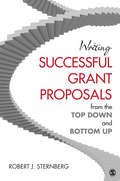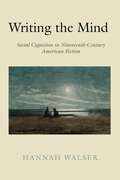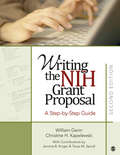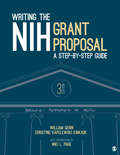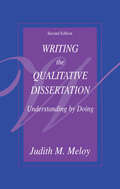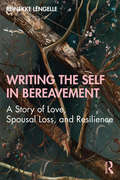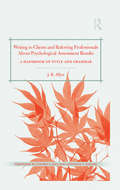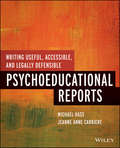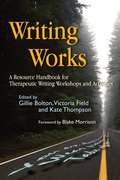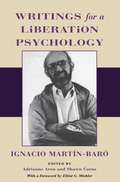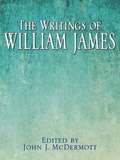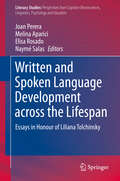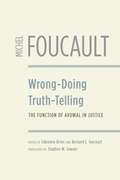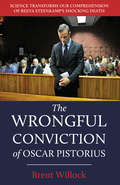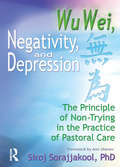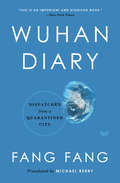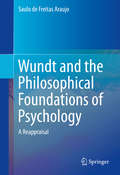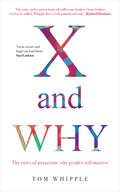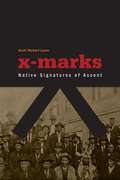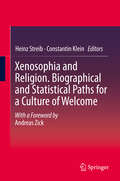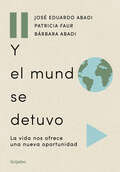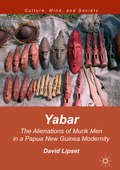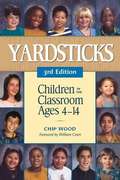- Table View
- List View
Writing Successful Grant Proposals from the Top Down and Bottom Up
by Dr Robert J. SternbergThis text provides comprehensive advice on how to build a successful grant proposal, from the top down and from the bottom up. Editor Robert J. Sternberg gathers editorial expertise from distinguished members of associations in the Federation of Associations of Behavioral and Brain Sciences, which includes some of the most successful grant applicants and grant givers in the field of brain and behavioral sciences. The chapter authors offer readers practical advice on planning, executing, submitting, and revising grant proposals in order to maximize their chances of success. Exploring both grant writers' and grant providers' perspectives, Writing Successful Grant Proposals from the Top Down and Bottom Up provides valuable insight into general strategies on how to write and submit proposals, as well as detailed information on the various types of proposals needed to reach particular research and teaching goals.
Writing the Mind: Social Cognition in Nineteenth-Century American Fiction
by Hannah WalserNovels are often said to help us understand how others think—especially when those others are profoundly different from us. When interpreting a character's behavior, readers are believed to make use of "Theory of Mind," the general human capacity to attribute mental states to other people. In many well-known nineteenth-century American novels, however, characters behave in ways that are opaque to readers, other characters, and even themselves, undermining efforts to explain their actions in terms of mental states like beliefs and intentions. Writing the Mind dives into these unintelligible moments to map the weaknesses of Theory of Mind and explore alternative frameworks for interpreting behavior. Through readings of authors such as Charles Brockden Brown, Herman Melville, Martin Delany, Harriet Beecher Stowe, Charles Chesnutt, and Mark Twain, Hannah Walser explains how experimental models of cognition lead to some of the strangest formal features of canonical American texts. These authors' attempts to found social life on something other than mental states not only invite us to revise our assumptions about the centrality of mind reading and empathy to the novel as a form; they can also help us understand more contemporary concepts in social cognition, including gaslighting and learned helplessness, with more conceptual rigor and historical depth.
Writing the NIH Grant Proposal: A Step-by-Step Guide
by William Gerin Christine Kapelewski Kinkade Jerome R. Itinger Tanya SpruillHands-on advice that simplifies, demystifies, and takes the fear out of writing a NIH grant proposal This fully updated book takes readers through the complex issues involved in applying for a prestigious NIH grant—from training grants to full-blown research awards. Actual forms from NIH grant applications—including the PHS 398 and the new SF 424 forms—are annotated to provide readers with step-by-step guidance that highlights unexpected nuances that can make all the difference between winning and losing a grant.
Writing the NIH Grant Proposal: A Step-by-Step Guide
by William Gerin Christine Kapelewski Kinkade Niki L. PageAuthors William Gerin, Christine Kapelewski, and Niki L. Page are here to help you secure NIH funding for your research! Writing the NIH Grant Proposal, Third Edition offers hands-on advice that simplifies, demystifies, and takes the fear out of writing a federal grant application. Acting as a virtual mentor, this book provides systematic guidance for every step of the NIH application process, including the administrative details, developing and managing collaborative relationships, budgeting, and building a research team. Helpful hints along the way provide tips from researchers who have received grants themselves. New to this Edition: Much more user-friendly in response to the updated NIH website Covers the new Application Submission System & Interface for Submission Tracking (ASSIST) online submission form for both single and multiple projects Revamped advice on substantive sections of the proposal to address lowered page allowance Coverage of the new scoring system and reviewer reporting system Coverage of the usage and submission of the new SF 424 forms
Writing the NIH Grant Proposal: A Step-by-Step Guide
by William Gerin Christine Kapelewski Kinkade Niki L. PageAuthors William Gerin, Christine Kapelewski, and Niki L. Page are here to help you secure NIH funding for your research! Writing the NIH Grant Proposal, Third Edition offers hands-on advice that simplifies, demystifies, and takes the fear out of writing a federal grant application. Acting as a virtual mentor, this book provides systematic guidance for every step of the NIH application process, including the administrative details, developing and managing collaborative relationships, budgeting, and building a research team. Helpful hints along the way provide tips from researchers who have received grants themselves. New to this Edition: Much more user-friendly in response to the updated NIH website Covers the new Application Submission System & Interface for Submission Tracking (ASSIST) online submission form for both single and multiple projects Revamped advice on substantive sections of the proposal to address lowered page allowance Coverage of the new scoring system and reviewer reporting system Coverage of the usage and submission of the new SF 424 forms
Writing the Qualitative Dissertation: Understanding by Doing
by Judith M. MeloyThe purpose of this book is to share, in rich detail, an understanding of how it feels and what it means to do qualitative research, and to provide support for doctoral students who choose this form of inquiry for their dissertation research.
Writing the Self in Bereavement: A Story of Love, Spousal Loss, and Resilience (Writing Lives: Ethnographic Narratives)
by Reinekke LengelleIn Writing the Self in Bereavement: A Story of Love, Spousal Loss, and Resilience, Reinekke Lengelle uses her abilities as a researcher, poet, and professor of therapeutic writing to tell a heartfelt and fearless story about her grief after the death of her spouse and the year and a half following his diagnosis, illness, and passing. This book powerfully demonstrates that writing can be a companion in bereavement. It uses and explains the latest research on coming to terms with spousal loss without being prescriptive. Integrated with this contemporary research are stories, poetry, and reflections on writing as a therapeutic process. The author unflinchingly explores a number of themes that are underrepresented in existing resources: how one deals with anger associated with loss, what a healthy response might be to unfinished business with the deceased, continuing conversations with the beloved (even for agnostics and atheists), ongoing sexual desire, and secondary losses. As a rare book where an author successfully combines a personal story, heart-rending poetry, up-to-date research on grief, and an evocative exploration of taboo topics in the context of widowhood, Writing the Self in Bereavement is uniquely valuable for those grieving a spouse or other loved one, those supporting others in bereavement, and those interested in the healing power of poetry and life writing. Researchers on death and dying, grief counsellors, and autoethnographers will also benefit from reading this resonant resource on love and loss.
Writing the Self in Bereavement: A Story of Love, Spousal Loss, and Resilience (ISSN)
by Reinekke LengelleWinner, ICQI 2022 Outstanding Qualitative Book AwardIn Writing the Self in Bereavement: A Story of Love, Spousal Loss, and Resilience, Reinekke Lengelle uses her abilities as a researcher, poet, and professor of therapeutic writing to tell a heartfelt and fearless story about her grief after the death of her spouse and the year and a half following his diagnosis, illness, and passing. This book powerfully demonstrates that writing can be a companion in bereavement. It uses and explains the latest research on coming to terms with spousal loss without being prescriptive. Integrated with this contemporary research are stories, poetry, and reflections on writing as a therapeutic process. The author unflinchingly explores a number of themes that are underrepresented in existing resources: how one deals with anger associated with loss, what a healthy response might be to unfinished business with the deceased, continuing conversations with the beloved (even for agnostics and atheists), ongoing sexual desire, and secondary losses. As a rare book where an author successfully combines a personal story, heart-rending poetry, up-to-date research on grief, and an evocative exploration of taboo topics in the context of widowhood, Writing the Self in Bereavement is uniquely valuable for those grieving a spouse or other loved one, those supporting others in bereavement, and those interested in the healing power of poetry and life writing. Researchers on death and dying, grief counsellors, and autoethnographers will also benefit from reading this resonant resource on love and loss.
Writing to Clients and Referring Professionals about Psychological Assessment Results: A Handbook of Style and Grammar
by J. B. AllynThis book is the first on the craft of effective writing structured expressly for the psychologist-assessor. Author J. B. Allyn, a professional writer who specializes in psychology, combines reference book with tutorial. She blends information on the qualities that create a writer’s unique presence on the page with illustrations of correct English grammar. All of the questions, answers, and illustrations evolved from the concerns of psychologist-assessors, as did the examples, which are grounded in their writing and communication needs. The result creates a guide for report writing that can be used by either practicing professionals or graduate psychology students.The book divides into three sections: The first and third sections discuss various aspects of effective communication, while the second is a handbook of common grammar problems. Helpful elements guide the reader through the text, including frequent bullet lists, tables and graphs, and grammar and style examples that are framed around assessment reports. It is also written in a conversational tone, which creates the same style it proposes for effectively written reports, and is a key tool for clear and appropriate communication. Readers will refer back to this book, both for quick tips on style and grammar, which are appropriate for any mental health practitioner, and for more detailed advice on writing and communication in assessment reports.
Writing Useful, Accessible, and Legally Defensible Psychoeducational Reports
by Jeanne Anne Carriere Michael Hass"This book focuses on how to write a psychological report that is first and foremost helpful to consumers, while also being technically and legally defensible. Like the reports the authors describe, the book is carefully organized, beautifully written, and accessible to practitioners as well as graduate students. It is a brilliant accomplishment that should be required reading for every school psychologist."--Brent Duncan, PhD, Professor of Psychology, Humboldt State University, Arcata CAPRACTICAL GUIDANCE ON WRITING USEFUL, ACCESSIBLE, AND LEGALLY DEFENSIBLE PSYCHOEDUCATIONAL REPORTSFrom clearly identifying reasons for referral to making recommendations based on assessment results, Writing Useful, Accessible, and Legally Defensible Psychoeducational Reports offers practical guidance for creating reports that enhance the understanding of children and their strengths and challenges in order to better meet their educational and functional needs.The authors offer step-by-step guidelines for developing an assessment plan in a collaborative process with parents, teachers, and other professionals, choosing appropriate assessment and data collection tools, gathering relevant information, and providing clear and feasible individualized recommendations that directly respond to referral concerns in a format easily understood by parents and teachers.Ideal for graduate students in school psychology, school psychologists, and other professionals in related fields who work with children in a school setting, Writing Useful, Accessible, and Legally Defensible Psychoeducational Reports:Provides specific suggestions for increasing the usefulness and accessibility of reports including readability, positive phrasing, and vocabularyIllustrates how to develop well-formed questions and how to choose assessment tools to answer referral questionsReviews the legal mandates of report writing and discusses what must be includedDemonstrates how to accurately document and integrate data from record review, interviews, observations, and testsDiscusses how the use of the referral-based consultative assessment and report writing model can promote more active involvement in collaboration, prevention, and interventionFeatures numerous real-world cases, helpful checklists, examples of question-driven referral reports, and a model interview protocol
Writing Works: A Resource Handbook for Therapeutic Writing Workshops and Activities
by Gillie Bolton Blake Morrison Victoria Field Kate ThompsonThe use of creative writing as a route to personal development is a powerful therapeutic tool - a fact that is recognized in the growing numbers of workshops and writing groups within professional contexts, including clinical, health and criminal justice settings. Writing Works is a guide for writers or therapists working with groups or individuals and is full of practical advice on everything from the equipment needed to run a session to ideas for themes, all backed up by the theory that underpins the methods explained. Experienced practitioners in the field contribute detailed illuminating accounts of organizing writing workshops for a wide range of different clients, together with examples of their outcomes. This book will be an invaluable start-up reference for arts therapists and professionals working across the health, social care and caring professions, and one that will be referred to again and again.
Writings for a Liberation Psychology
by Ignacio Martín-Baró"In your country," Ignacio Martín-Baró remarked to a North American colleague, "it's publish or perish. In ours, it's publish and perish." In November 1989 a Salvadoran death squad extinguished his eloquent voice, raised so often and so passionately against oppression in his adopted country. A Spanish-born Jesuit priest trained in psychology at the University of Chicago, Martín-Baró devoted much of his career to making psychology speak to the community as well as to the individual. This collection of his writings, the first in English translation, clarifies Martín-Baró's importance in Latin American psychology and reveals a major force in the field of social theory. Gathering essays from an array of professional journals, this volume introduces readers to the questions and concerns that shaped Martín-Baró's thinking over several decades: the psychological dimensions of political repression, the impact of violence and trauma on child development and mental health, the use of psychology for political ends, religion as a tool of ideology, and defining the "real" and the "normal" under conditions of state-sponsored violence and oppression, among others. Though grounded in the harsh realities of civil conflict in Central America, these essays have broad relevance in a world where political and social turmoil determines the conditions of daily life for so many. In them we encounter Martín-Baró's humane, impassioned voice, reaffirming the essential connections among mental health, human rights, and the struggle against injustice. His analysis of contemporary social problems, and of the failure of the social sciences to address those problems, permits us to understand not only the substance of his contribution to social thought but also his lifelong commitment to the campesinos of El Salvador.
The Writings of William James
by John J. McdermottA Modern Library collection of writings by the American psychologist, philosopher, and writer William James. His writings touch on themes of psychology, religion, free will, and pragmatism.
Written and Spoken Language Development across the Lifespan
by Joan Perera Melina Aparici Elisa Rosado Naymé SalasThis multidisciplinary volume offers insights on oral and written language development and how it takes place in literate societies. The volume covers topics from early to late language development, its interaction with literacy practices, including several languages, monolingual and multilingual contexts, different scripts, as well as typical and atypical development. Inspired by the work of Liliana Tolchinsky, a leading expert in language and literacy development, a group of internationally renowned scholars offers a state-of-the-art overview of current thinking in language development in literate societies in its broadest sense. Contributors offer a personal tribute to Liliana Tolchinsky in the opening section.
Wrong-Doing, Truth-Telling: The Function of Avowal in Justice
by Michel Foucault edited by Fabienne Brion Bernard E. Harcourt translated by Stephen W. SawyerThree years before his death, Michel Foucault delivered a series of lectures at the Catholic University of Louvain that until recently remained almost unknown. These lectures--which focus on the role of avowal, or confession, in the determination of truth and justice--provide the missing link between Foucault's early work on madness, delinquency, and sexuality and his later explorations of subjectivity in Greek and Roman antiquity. Ranging broadly from Homer to the twentieth century, Foucault traces the early use of truth-telling in ancient Greece and follows it through to practices of self-examination in monastic times. By the nineteenth century, the avowal of wrongdoing was no longer sufficient to satisfy the call for justice; there remained the question of who the "criminal" was and what formative factors contributed to his wrong-doing. The call for psychiatric expertise marked the birth of the discipline of psychiatry in the nineteenth and twentieth centuries as well as its widespread recognition as the foundation of criminology and modern criminal justice. Published here for the first time, the 1981 lectures have been superbly translated by Stephen W. Sawyer and expertly edited and extensively annotated by Fabienne Brion and Bernard E. Harcourt. They are accompanied by two contemporaneous interviews with Foucault in which he elaborates on a number of the key themes. An essential companion to "Discipline and Punish," "Wrong-Doing, Truth-Telling" will take its place as one of the most significant works of Foucault to appear in decades, and will be necessary reading for all those interested in his thought.
The Wrongful Conviction of Oscar Pistorius: Science Transforms our Comprehension of Reeva Steenkamp’s Shocking Death
by Brent WillockJust when the world thought Oscar Pistorius’ meteoric rise to Olympic glory and international celebrity had terminated abysmally in prison, Brent Willock’s scientific perspective reopens this gripping narrative for an astonishing re-view.Olympian Oscar Pistorius’ spectacular assent to fame ground to a screeching halt in the wee hours of Valentine’s Day, 2013. Hearing a sound emanating from his bathroom, he grabbed his pistol and he stumbled to the washroom, screaming at the intruders to leave. Fearing someone was about to emerge to harm him and his girlfriend, Reeva, he fired four bullets into the bathroom. Soon he realized he had killed his lover. Horrified, he summoned the authorities. The investigating detective believed this was yet another case of an escalating argument where a man murdered his partner. World opinion is split. Some believe Oscar. Others are convinced he committed a despicable crime of passion.Distinguished clinical psychologist Brent Willock brings an entirely new perspective to bear on these horrific events: that Oscar’s horrific actions occurred while he was in a state of paradoxical sleep, also known as parasomnia. Throughout this book, Willock uses scientific scrutiny and legal precedence to resolve the crucial anomalies surrounding the Oscar Pistorius trial. Willock also discusses how mental health experts and the defense team might have overlooked the hypothesis of parasomnia that could have exonerated Oscar.Millions who followed the Blade Runner’s astonishing achievements, uplifted and inspired by his triumph over physical adversity, were crushed by his precipitous plunge from grace. They were baffled. Even Oscar himself, in a television interview shortly before his sentencing, achingly asked, “I always think, How did this possibly happen? How could this have happened?” At last, Willock’s elegant work responds to these poignant questions that have so plagued and pained Reeva’s family, friends, Oscar, and, indeed, the world.
Wu Wei, Negativity, and Depression: The Principle of Non-Trying in the Practice of Pastoral Care
by Siroj SorajjakoolDiscover a pastoral approach to depression that combines Eastern wisdom and Western science!Wu Wei, Negativity, and Depression reveals a way to break the cycle of depression, not by denying it or fighting it, but by the ancient principle of wu wei, non-trying. The bleak cycle of depression starts when people experience negativity. They turn inward to try to find self-esteem, but the negativity strips all the power of self-affirmation from them. The gap between is and ought--how they see themselves and how they want to be--is too great to bridge. The cycle known as self-regulatory perseveration means that depressed persons are caught in a desperate, fruitless search for affirmation. Instead of self-esteem, they find self-criticism and further negative thoughts. Yet they keep looking . . . and looking . . . and looking. The more they look for self-worth inside, the less they find, and the harder they try--the cycle continues. When trying simply doesn&’t work, wu wei, the principle of letting go, may help break that cycle. When trying simply doesn't work, wu wei, not-trying, may help. Wu wei is the principle of letting go. By giving up on the self-imposed and unattainable oughts and shoulds, the depressed person stops focusing on self. Wu wei breaks the cycle of negativity, allowing the depressed person to begin to heal.Wu Wei, Negativity, and Depression offers a comprehensive discussion of depression, including: epidemiology of depression etiology and biological causes psychosocial theories standard treatments of the past and present pastoral care of depressed persons This important book constructs a possible approach to depressed souls weary of fighting and trying to fix themselves. Wu Wei, Negativity, and Depression can bring new hope to those who most need it.
Wuhan Diary: Dispatches from a Quarantined City
by Fang FangFrom one of China’s most acclaimed and decorated writers comes a powerful first-person account of life in Wuhan during the COVID-19 outbreak.On January 25, 2020, after the central government imposed a lockdown in Wuhan, acclaimed Chinese writer Fang Fang began publishing an online diary. In the days and weeks that followed, Fang Fang’s nightly postings gave voice to the fears, frustrations, anger, and hope of millions of her fellow citizens, reflecting on the psychological impact of forced isolation, the role of the internet as both community lifeline and source of misinformation, and most tragically, the lives of neighbors and friends taken by the deadly virus. A fascinating eyewitness account of events as they unfold, Wuhan Diary captures the challenges of daily life and the changing moods and emotions of being quarantined without reliable information. Fang Fang finds solace in small domestic comforts and is inspired by the courage of friends, health professionals and volunteers, as well as the resilience and perseverance of Wuhan’s nine million residents. But, by claiming the writer´s duty to record she also speaks out against social injustice, abuse of power, and other problems which impeded the response to the epidemic and gets herself embroiled in online controversies because of it.As Fang Fang documents the beginning of the global health crisis in real time, we are able to identify patterns and mistakes that many of the countries dealing with the novel coronavirus have later repeated. She reminds us that, in the face of the new virus, the plight of the citizens of Wuhan is also that of citizens everywhere. As Fang Fang writes: “The virus is the common enemy of humankind; that is a lesson for all humanity. The only way we can conquer this virus and free ourselves from its grip is for all members of humankind to work together.” Blending the intimate and the epic, the profound and the quotidian, Wuhan Diary is a remarkable record of an extraordinary time. Translated from the Chinese by Michael Berry
Wundt and the Philosophical Foundations of Psychology
by Saulo Freitas AraujoThis book reassesses the seminal work of Wilhelm Wundt bydiscussing the history and philosophy of psychology. It traces the pioneeringtheorist's intellectual development and the evolution of psychology throughouthis career. The author draws on little-known sources to situate psychologicalconcepts in Wundt's philosophical thought and address common myths andmisconceptions relating to Wundt's ideas. The ideas presented in this book showwhy Wundt's work remains relevant in this era of ongoing mind/brain debate and interestcontinues in the links between psychology and philosophy. Featured topics include: Theoretical and philosophical foundations of Wundt's early work in scientific psychology. Wundt's conception of scientific philosophy in relation to his theory of knowledge. The epistemological dimensions of Wundt's final project in scientific psychology. Wundt and thePhilosophical Foundations of Psychology is a valuable resource for researchers,professors, and graduate students in cognitive and related psychology andphilosophy disciplines.
X and Why: The rules of attraction: why gender still matters
by Tom WhippleIn the last century it was argued that men are from Mars and women are from Venus - but things have moved on a long way since then. In this timely new approach to the debate, Tom Whipple travels far and wide - from a Home Counties swingers' party to a gay penguin sanctuary in Germany - and draws on the latest studies in behavioural science as well as fascinating explorations into anthropology to present a surprising tale of expectations and mismatches.If you are currently single, this book is about your place in the dating market - your successes, your failures and what they mean. If you are in a relationship, it is about why you chose the person you are with, why they chose you - and the circumstances in which either of you might put it all at risk and stray.In X and Why, Tom Whipple delves into the sexual subconscious to explain the inner workings of character and desire. It will change the way you see yourself and everyone around you.
X-Marks: Native Signatures of Assent
by Scott Richard LyonsScott Richard Lyons explores the complexity of contemporary Indian identity and current debates among Indians about traditionalism, nationalism, and tribalism.
Xenosophia and Religion. Biographical and Statistical Paths for a Culture of Welcome: Biographical And Statistical Paths For A Culture Of Welcome
by Heinz Streib Constantin KleinThis book documents the current polarization in Germany regarding the issue of refugee immigration. It presents quantitative estimates for both xenophobia and xenophilia in the German population, including short-time changes. The book suggests a conceptual change of perspectives. It focuses not only on the pathogenic model that accounts for outcomes such as xenophobia, Islamophobia and other forms of (inter-religious) prejudice, but on a salutogenic model. In the book’s view, the salutogenic model entails xenosophia: the wisdom, creativity and inspiration that emerges from the encounter with the strange and the strange religion. The book addresses individual dispositions, which may lead to xenophobia or xenosophia, and takes into account predictors such as religiosity, religious schemata, value preferences, tolerance of complexity, and violence legitimizing norms of masculinity. A selection of case studies present typical biographical trajectories toward xenosophia.
Y el mundo se detuvo: La vida nos ofrece una nueva oportunidad
by José Eduardo Abadi Patricia Faur Bárbara AbadiLos psicoanalistas José Eduardo Abadi, Patricia Faur y Bárbara Abadi analizan esta época donde todo se resignifica: el amor, la muerte, la información, los vínculos y hasta el poder político. Los autores hacen un gran aporte a esta nueva oportunidad de vivir en un mundo que se detuvo, pero está volviendo a arrancar. La pandemia puso al mundo patas para arriba, lo que significó, y aún lo hace, un antes y un después en nuestra vida. Todo cambió de un día para el otro: dejamos de ir a trabajar, de ver a nuestros familiares y amigos, se suspendieron las clases de los chicos, no pudimos despedir a seres queridos que fallecieron. Nos quedamos sin parámetros cotidianos, sin nuestra rutina y nuestros rituales. Paulatinamente, el confinamiento se fue flexibilizando mientras avanza la campaña de vacunación, si bien las consecuencias de estos tiempos son, como el virus, invisibles y aún no las podemos percibir. Los psicoanalistas José Eduardo Abadi, Patricia Faur y Bárbara Abadi despliegan su experiencia para desentrañar y echar luz sobre una época donde todo se ha replanteado: el amor, la muerte, la información, el vínculo con los hijos y hasta el poder político. Con una gran capacidad de observación y análisis, los autores hacen un aporte fundamental para esta nueva oportunidad de afrontar la vida en un mundo que se detuvo, pero está volviendo a arrancar.
Yabar
by David LipsetThis book analyses the dual alienations of a coastal group rural men, the Murik of Papua New Guinea. David Lipset argues that Murik men engage in a Bakhtinian dialogue: voicing their alienation from both their own, indigenous masculinity, as well as from the postcolonial modernity in which they find themselves adrift. Lipset analyses young men's elusive expressions of desire in courtship narratives, marijuana discourse, and mobile phone use--in which generational tensions play out together with their disaffection from the state. He also borrows from Lacanian psychoanalysis in discussing how men's dialogue of dual alienation appears in folk theater, in material substitutions--most notably, in the replacement of outrigger canoes by fiberglass boats--as well as in rising sea-levels, and the looming possibility of resettlement.
Yardsticks: Children In The Classroom Ages 4-14 (Third Edition)
by Chip WoodWritten with warmth and humor, Yardsticks offers clear descriptions of children's development. This comprehensive, user-friendly reference helps teachers and administrators use knowledge of child development to shape classrooms and schools where all children can succeed. For each age, this book includes: Narrative description of developmental traits Charts summarizing physical, social, language, and cognitive growth patterns Suggestions for curricular areas: reading, writing, mathematics, and thematic units Favorite books for different ages. What's new in the third edition: A new, brief overview of issues in the development of bilingualism and biliteracy among Latino/Hispanic children A new appendix on the "birthday cluster exercise" for applying the information in the book to working with a whole class of students An updated list of recommended children's books An updated list of recommended resources for teachers and parents.
